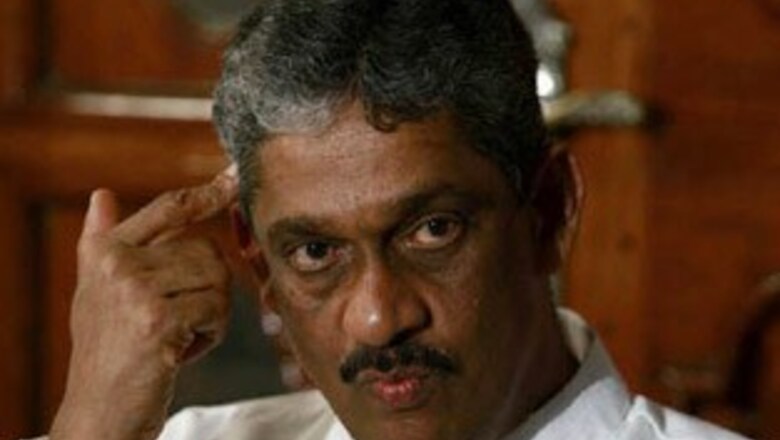
views
Colombo: Sri Lanka's government on Tuesday said defeated presidential candidate General Sarath Fonseka was "hell-bent" on betrayal and would be court-martialled on charges of conspiring against the president.
Fonseka lost by an 18 percentage point margin to President Mahinda Rajapaksa in a January 26 election, after which he accused his former commander-in-chief of vote-rigging, vowing to challenge the results in court and stand for parliament.
Sri Lankan troops arrested their former chief on Monday. The government said the general, who quit the army in November to enter the presidential race, would be tried for conspiring with opposition politicians while still serving.
Under Sri Lankan military law, the armed forces can arrest and try personnel who have left service for up to six months after their departure, defence spokesman Keheliya Rambukwella told a press conference.
"Still investigations are going on and information is emerging from the investigations," he said.
Sri Lanka's Government Information Department on Tuesday said Fonseka's comments to reporters, quoted by the BBC, that he would testify in a war crimes probe proved his disloyalty to the troops he led to defeat the Tamil Tigers rebels and end a 25-year war.
"This report of BBC confirms beyond doubt that the retired general was hell-bent on betraying the gallant armed forces of Sri Lanka who saved the nation from the most ruthless terrorist group in the world," the statement said.
Opposition politicians who backed Fonseka's election bid condemned his arrest, and vowed to seek legal redress.
"To all of us it is evident that this is a government which is not simply dictatorial but fascist and they are all out to humiliate him, harass him and go on a journey of vendetta," Sri Lanka Muslim Congress leader Rauff Hakeem told reporters.
Sri Lanka's stock market, one of 2009's best performers with a 125 percent return, closed down 0.11 percent from a record high on Monday. It has shrugged off much of the post-election sparring, hitting new peaks since Rajapaksa won.
"People are still in shock (over the arrest)," said Prashan Fernando, executive director of Acuity Stockbrokers. "But we expected a market correction and the fall cannot be attributed to Fonseka's arrest."
No mood to forgive
The general had stood side-by-side with Rajapaksa in May after the Tamil Tigers' defeat, but fell out later over what he said was false accusations of planning a coup and a promotion he complained had sidelined him by stripping his powers.
PAGE_BREAK
He then became the common candidate of several weakened opposition parties with divergent ideologies, who united solely for the purpose of beating Rajapaksa. Some of the parties had earlier criticised him sharply for his conduct of the war.
"I can't see the purpose being served because it sort of turns up the pro-Fonseka elements once again to vigorously take up his cause," said Col. R. Hariharan, an analyst and retired Indian army intelligence officer who served in Sri Lanka.
"The powers that be are not in a mood to forgive."
The campaign turned bitter and personal, with Fonseka and Rajapaksa trading allegations of corruption and misconduct.
The government since vote-counting began has accused Fonseka, who in May was lionised as a national hero for his role in defeating the Tamil Tigers, of plotting with ex-army officers and loyalists in the army to assassinate the president in a coup.
That suspicion, the government said, prompted the deployment of troops to surround the hotel where Fonseka was staying on election night. Police later raided his office and arrested at least 37 of his supporters and staff, including ex-army officers.
Fourteen senior army officers were also forced to retire for openly supporting him, and 40 were transferred after the poll.
Thousands of civilians were killed in the final months of the war as the army, led by Fonseka, bore down on the Tigers. The United Nations, United States and rights groups have urged some kind of accountability for possible war crimes.
Sri Lanka has adamantly refused an external probe, although the president has appointed a commission to look at potential charges. Presidential commissions in Sri Lanka have a long history of taking little action, rights groups say.


















Comments
0 comment